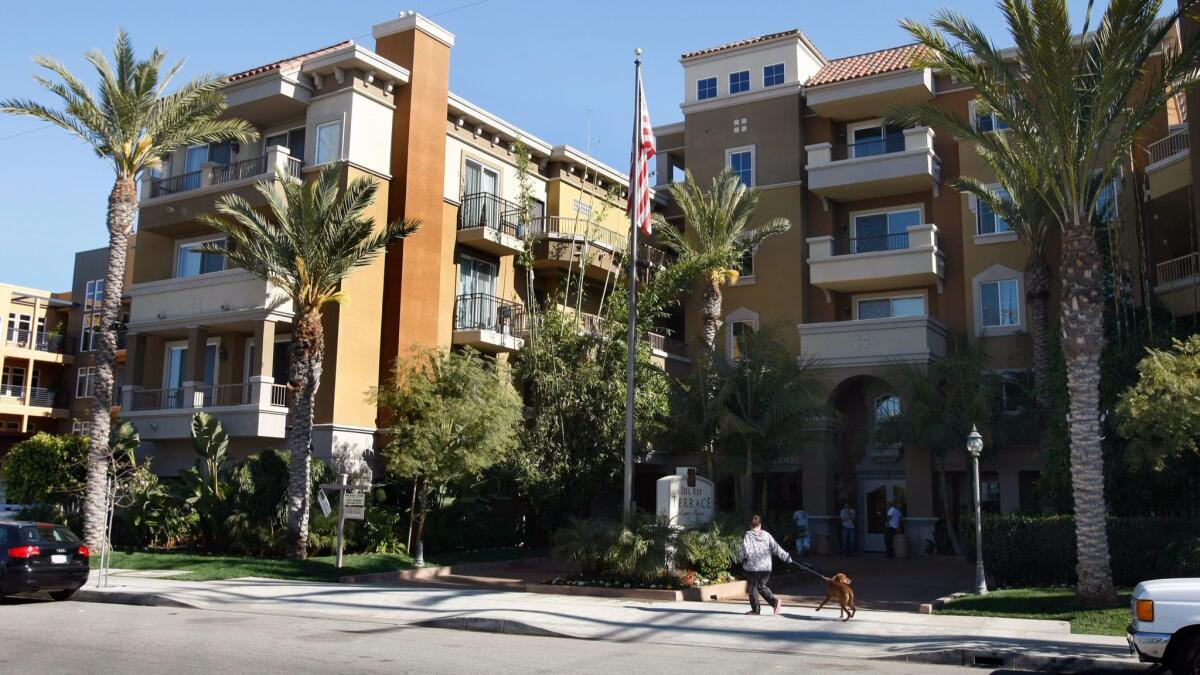Q&A: When it comes to noisy neighbors, it’s the board’s responsibility to enforce association rules

- Share via
Question: I’ve owned and lived in my very small Los Angeles condo complex for 16 years and am president of the association. Many of my neighbors are established professionals, including a couple of financial advisors across the hall. They have lived in the building for more than 40 years and have no plans to move. But they have serious drinking problems and never-ending blowout fights.
At all hours of the day and night they scream at each other and throw and slam stuff inside their unit. Our units are in an area of the complex where noise ricochets out their balcony, bounces across the building behind ours and then comes right back through my balcony. I have called the police several times and one of them was arrested once when the police noticed the other had bruises, but no charges were filed.
Language in our covenants, conditions, and restrictions provides that nothing shall be done to create unreasonable noise, disturbance or annoyance to other owners in the use and enjoyment of their units. But the only stated remedies are seeking injunctive relief (good luck with that) and actual damages (hard to quantify unless their noise prevented me or others from renting or selling our units). Do I have any other recourse? Can they be forced to sell their unit under any California laws?
Answer: It appears that you are experiencing the challenges of high-density living that one California court, in a case involving feuding neighbors, described as “the natural consequence of living among other people in an urban or suburban environment. A reasonable person must expect to suffer and submit to some inconveniences and annoyances from the reasonable use of property by neighbors, particularly in the sometimes close living of a suburban residential neighborhood.”
Most owners are aware there are consequences for breaching their association’s covenants, conditions, and restrictions, but those consequences only work when the board enforces it. Forcing your neighbors to sell their unit or move is unlikely. And while police will respond to noise complaints and ask your neighbors to keep quiet — and may even make an arrest for domestic disturbance, prosecutors often decline to pursue such cases.
If you filed a civil lawsuit and obtained a restraining order or injunction, that also is no guarantee the neighbors will keep quiet. For the police to make an arrest on a violation of a restraining order, they have to witness the violation — an unlikely scenario given your set of facts. A judge could find owners in contempt for violating an injunction but that involves a lot of time, money and gathering of evidence on your part with little guarantee of success.
The upshot is that your legal options are woefully limited, especially given the common view that dwellers of common-interest housing are simply expected to put up with it. The court in the case involving the feuding neighbors wrote in its opinion: “People who live in organized communities must of necessity suffer some inconvenience and annoyance from their neighbors and must submit to annoyances consequent upon the reasonable use of property by others.”
So although your neighbors’ conduct goes beyond what is reasonable for what the average person is expected to endure, sometimes there are problems that courts and the police are ill-equipped to deal with.
You might try to sensitively steer your neighbors toward a dispute resolution program. Shaphan Roberts, director of the city attorney’s Dispute Resolution Program, (213) 978-1880, welcomes the opportunity to interact with residents in resolving issues like these. There is no fee to use these services. But it is not your responsibility to do so — and your attempted assistance may be misconstrued as interference. That then makes it the board’s responsibility to enforce the association’s governing documents, rules and regulations.
As a board director, failure to take action to protect the quiet use and enjoyment of your and others’ units may subject the board, and association, to liability. Breaching its own duties to all the owners sets a dangerous precedent for other violators. If it hasn’t already, the board should establish a fine schedule for violations of the association’s rules and regulations, including nuisance provisions in the CC&Rs and perhaps quiet hours.
When your neighbor breaches those rules the board can impose a fine. Should your neighbors continue to ignore the rules and mounting fines, then the board can file a lien against their property and suspend their membership privileges. If your neighbors’ conduct is egregious enough, and if your governing documents provide for this remedy, your board may be able to install soundproofing in one or both units’ common-area walls. The neighbor can be invoiced for the cost through a special assessment, with the failure to pay resulting in foreclosure.
Finally, nothing prevents you from moving, though there are laws requiring disclosures at the time of sale that include problematic neighbors.
Still, being miserable for 16 years is enough!
Zachary Levine, a partner at Wolk & Levine, a business and intellectual property law firm, co-wrote this column. Vanitzian is an arbitrator and mediator. Send questions to Donie Vanitzian, JD, P.O. Box 10490, Marina del Rey, CA 90295 ornoexit@mindspring.com
More to Read
Inside the business of entertainment
The Wide Shot brings you news, analysis and insights on everything from streaming wars to production — and what it all means for the future.
You may occasionally receive promotional content from the Los Angeles Times.










